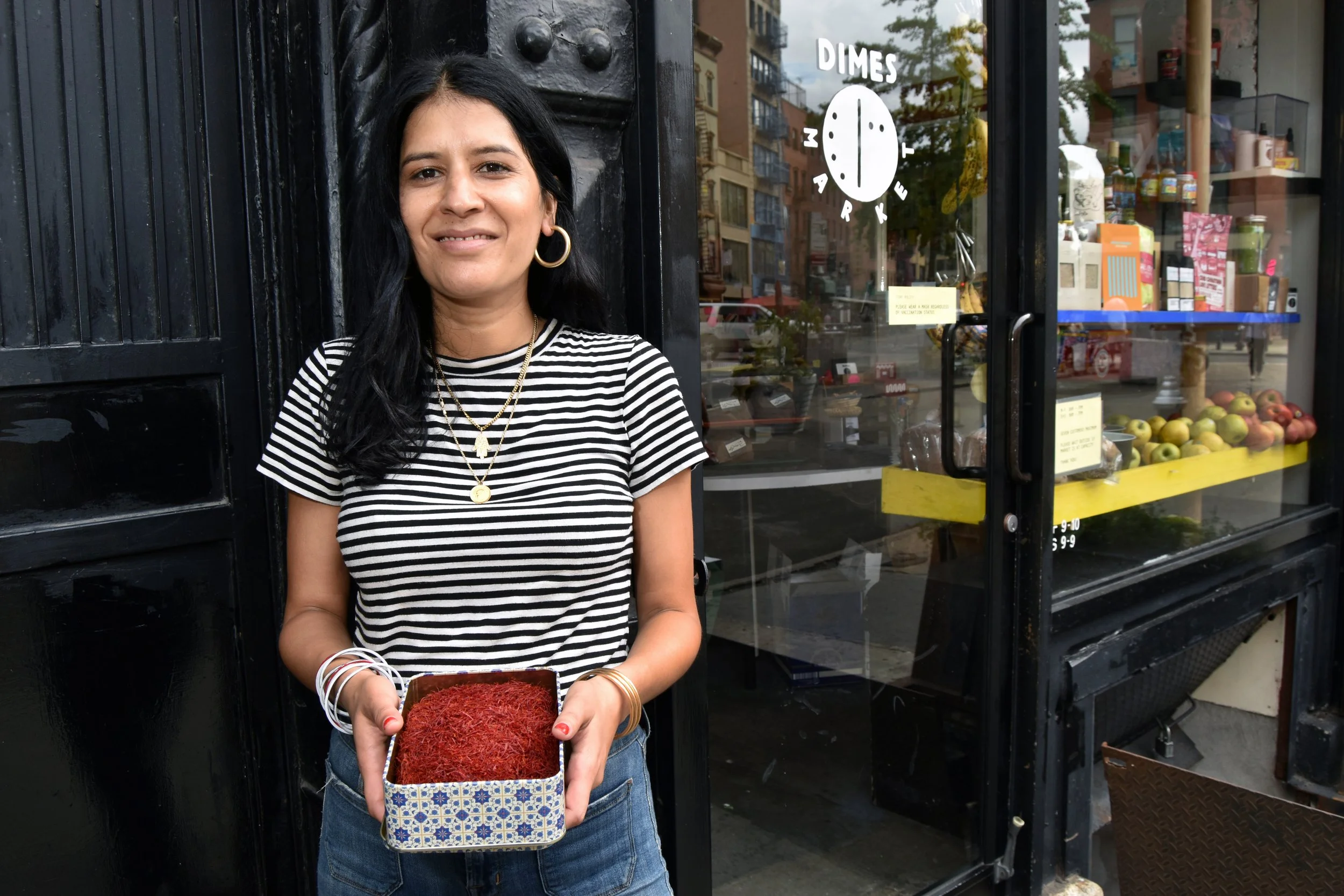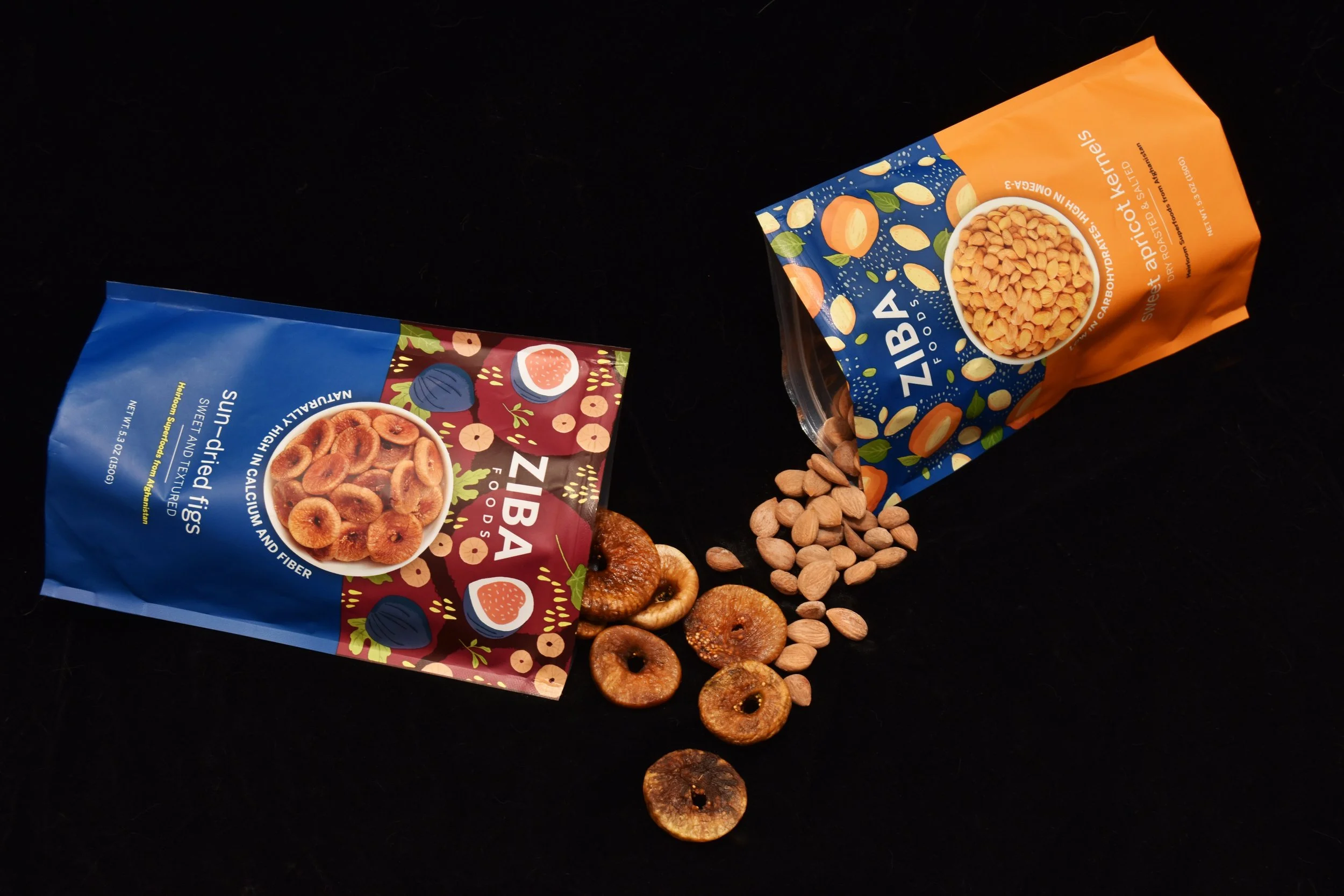How Afghan startup founders in the U.S. are keeping businesses (and workers) alive back home
Palwasha Raqib runs a New York-based saffron company. She and other entrepreneurs who source products from Afghanistan are navigating the chaos as best as they can.
Mina Sahar Saffron founder Palwasha Raqib in front of Dimes Market in New York City with her saffron imported from Afghanistan. Photo: Nina Roberts
Published on The Business of Business on September 8, 2021
The Taliban’s swift takeover of Afghanistan last month shocked the world, leaving many people fearful for 40 million inhabitants now at the mercy of Islamic extremists, especially women and people who supported the U.S.
In the U.S., entrepreneurs who source products from Afghanistan face other worries — how they can keep their supply chains and businesses running, and maintain an economic lifeline for Afghan communities.
“I'm not giving up on the few people that are relying on me as a small business,” said Palwasha Raqib the founder of Mina Sahar Saffron based in New York City. “The harvest has to happen.”
Mina Sahar Saffron, Heray Spice based in Chicago, and Ziba Foods, which operates out of New York and Dubai, are businesses founded or co-founded by Afghan immigrants and refugees. These startups source agricultural goods—bright red saffron threads, dried fruits and heirloom almonds among other products—from their former homeland. They employ multiple farmers, factory workers and office administrators, including women, in Kabul and Afghanistan’s Herat region.
Despite the Taliban’s resurgence, horrific violence in the country, and the withdrawal of US troops completed on Aug. 31, these startups are carrying on with their businesses. Often on the phone a dozen times a day with their teams on the ground, they are constantly monitoring the safety of their female workforce and farmers, addressing new supply chain challenges, and figuring out logistics and banking.
Mina Sahar saffron from Afghanistan. Photo: Nina Roberts
“I’m gravely concerned about the harrowing images coming out of the airport,” said Raqib after the bloody suicide bombing at Kabul’s Hamid Karzai International Airport on August 26, leaving 13 US service people and more than 160 Afghans dead, “but I still refuse to give up hope.”
She added, “I'm concerned for my business, but more concerned for the human suffering. It’s a double whammy when you are invested personally, and it’s your bread and butter.”
At the moment, no one knows for sure whether products can still be exported, and if business can still go on. The Taliban’s new policies, likely to roll out over the next few months, and whether other countries decide to impose economic sanctions, will dictate whether these startups can continue.
Raqib, a lawyer, launched Mina Sahar Saffron last year, which sources saffron from one cooperative. She calls the current situation in Afghanistan “disheartening,” but it’s motivated her to push growing her business. “It's the way I can support the common farmer, the common person in Afghanistan,” explains Raqib, who prays the county will stabilize. Raqib fled Afghanistan as a child with her family during the Soviet invasion. They were resettled in Maine as refugees, and her extended family remains in Afghanistan.
Mina Sahar Saffron sells at Dimes Market, a neighborhood grocery store in lower Manhattan for $18 a gram, and wholesale at the spice shop SOS Chefs, Essex Olive & Spice, among other specialty shops including Morning Glory, in her hometown of Brunswick, Maine, and through her ecommerce website.
After images of Afghans evacuating the last days of August were broadcast worldwide, pundits widely declared that the country would suffer from a “brain drain” as its best and brightest fled. It is unclear what the economy will look like for Afghans who remain in the country. The founders of U.S.-based startups want to do their part to help provide jobs and other sources of income.
Heray Spice saffron from Afghanistan. Photo: Nina Roberts
Mohammed Salehi, founder of Heray Spice, based in Chicago, has been selling saffron in the US since 2017. He also recently introduced Afghan tea and cumin to his buyers. Salehi was an interpreter for the US military in Afghanistan, allowing him to arrive in the US on a special visa in 2014.
“It shocked me,” Salehi said of the Taliban takeover, “I was not expecting this.” Salehi thought Afghanistan would have an eventual coalition government between the Taliban and the now collapsed Afghan government. He’s not letting Afghanistan’s current disorder deter him from carrying on with his saffron business.
Heray Spice serves approximately 100 customers a month, from home cooks to restaurants, according to Salehi, which in turn supports 28 farming families in the Herat region of Afghanistan. Salehi remains committed to his business and to Afghan farmers. “I don’t give up,” he told us.
Salehi comes from a saffron farming family. Despite already driving an Uber, working as a real estate property assistant manager and going to school full time in Chicago, Salehi launched Heray Spice after discovering what passes for saffron in the US. He had tried to make saffron rice for the first time in the U.S. and the “saffron” he bought he described as “smelling like tobacco.” (It should have a bright, earthy, slightly floral smell; Saffron is dried stigmas harvested from a type of crocus flower.)
Heray Spice has a sufficient supply of saffron for several months, but Salehi worries about the logistics of future shipments. Will cargo or commercial flights resume at Kabul’s airport? Will the Taliban’s policies destabilize the country? Will companies critical to his business and others, like FedEx and DHL have to leave? There are reports that banks have been shuttered, and for a time Western Union suspended service to the country.
Another concern is whether the Taliban will encourage farmers to cultivate poppy for opium and heroin, instead of saffron. During a press conference, Taliban spokesman Zabihullah Mujahid said that would not be the case, although international law enforcement agencies are skeptical. Afghanistan produces more than 80% of the world’s opium and heroin supplies, according to a recent UN Office of Drugs and Crime report. About 402,782 acres of poppy fields blanket the country. In the past, the Taliban taxed poppy farmers in the form of “ushr,” an Islamic tithe on agriculture products, which should go towards the needy, but ends up in the Taliban’s pockets.
Ziba Foods launched in 2015 specializing in Afghan heirloom almonds, wild baby pistachios, figs, dried white mulberries and apricot kernels, among other specialty products. Packaged in colorful pouches with exuberant patterns and a clean typeface, Ziba products sell at 1,500 retail stores, primarily in the US, from Cost Plus World Market and Erewhon among other regional chains to specialty markets like Murray’s Cheese.
Ziba co-founder Raffi Vartanian. Photo: Nina Roberts
“The only thing we can do is keep the factory open and then wait to see what happens to the country,” said Kabir Arghandiwal, one of Ziba’s four co-founders. As the situation unfolds in Afghanistan, which Arghandiwal calls “heartbreaking,” it’s triggering memories of his own dramatic exit from Afghanistan as a child during the Soviet invasion. Arghandiwal eventually was resettled in Northern California as a refugee, by way of Pakistan, Turkey and Germany. Arghandiwal, who has a background in finance, returned to Afghanistan in 2002 to help rebuild the country, he eventually settled in Dubai.
Ziba’s factory is located outside Kabul. The Ziba team on the ground, which includes women, reopened a week after the Taliban took control of the country. So far, there have been no restrictions placed on women, they continue to work at the factory.
Arghandiwal believes that women’s rights will be the issue that would force the international community to impose sanctions on Afghanistan. Sanctions are what these entrepreneurs dread and fear, as sanctions would not only hurt ordinary Afghans, but would also be the death knell to their businesses.
Currently, Ziba is focused on business as usual. “Our employees have helped as a source of hope,” said Arghandiwal, “people who are not going to simply give up just because the Taliban came to their country.”
Sun-dried figs and sweet apricot kernels from Ziba Foods, based in Afghanistan. Photo: Nina Roberts
“We have to just roll with the logistic challenges and some of those other punches,” concedes co-founder Raffi Vartanian, also based in Dubai, “and make sure that team is safe.” Ziba is keeping their goal of buying approximately 36 tons of dried fruits and nuts in 2021.
These startup founders anxiously wait for the Taliban to reveal themselves. Has the “Taliban 2.0,” as it is being called, modernized its policies since the 1990s? Or will it revert to ruthless tactics?
All of these startup founders are quick to point out that Afghanistan is vastly different today than 20-plus years ago when the Taliban previously ruled. “Everyone has smartphones,” said Raqib, who was last in Afghanistan in 2019. Arghandiwal noted that information freely flows through social media, the internet and TV, unlike the 1990s. Afghanistan has a young population. Approximately 42% were under 14 years old as of 2019, and have never lived under the Taliban.
The Afghan founders of Mina Sahar Saffron, Heray Spice and Ziba Foods, are cognizant that they have the luxury of living outside Afghanistan and the privilege of a US passport. But their professional and personal lives are tied to their homeland. “I just feel like I have this gift,” said Raqib, “that maybe I'm able to make a small difference.”




